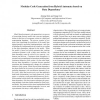Free Online Productivity Tools
i2Speak
i2Symbol
i2OCR
iTex2Img
iWeb2Print
iWeb2Shot
i2Type
iPdf2Split
iPdf2Merge
i2Bopomofo
i2Arabic
i2Style
i2Image
i2PDF
iLatex2Rtf
Sci2ools
110
click to vote
RTAS
2003
IEEE
2003
IEEE
Modular Code Generation from Hybrid Automata based on Data Dependency
Model-based automatic code generation is a process of converting abstract models into concrete implementations in the form of a program written in a high-level programming language. The process consists of two steps, first translating the primitives of the model into (approximately) equivalent implementations, and then scheduling the implementations of primitives according to the data dependency inherent in the model. When the model is based on hybrid automata that combine continuous dynamics with a finite state machine, the data dependency must be viewed in two aspects: continuous and discrete. Continuous data dependency is present between mathematical equations modeling timecontinuous behavior of the system. On the other hand, discrete data dependency is present between guarded transitions that instantaneously change the continuous behavior of the system. While discrete data dependency has been studied in the context of code generation from modeling languages with synchronous sema...
Related Content
| Added | 05 Jul 2010 |
| Updated | 05 Jul 2010 |
| Type | Conference |
| Year | 2003 |
| Where | RTAS |
| Authors | Jesung Kim, Insup Lee |
Comments (0)

